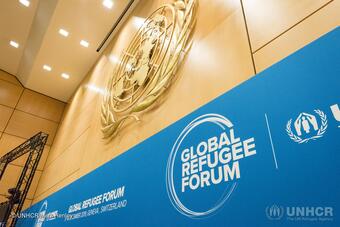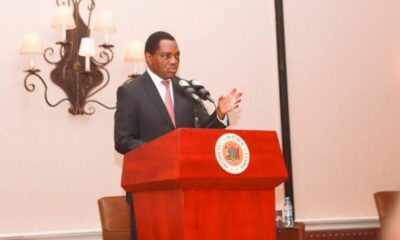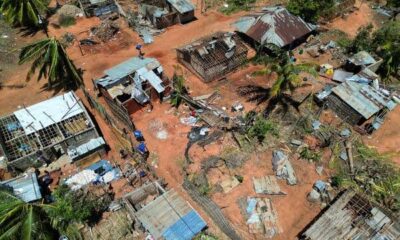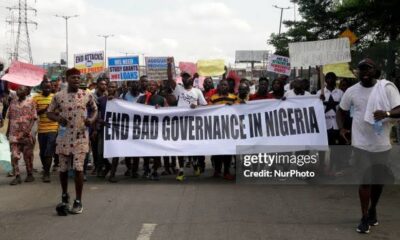Strictly Personal
Zambia at the 2023 Global Refugee Forum, By Isaac Mwanza
Published
1 year agoon

The global spotlight will shine on Geneva, where leaders from around the world will convene for the second Global Refugee Forum. The Zambian Government delegation, led by Her Honour the Vice President, Mutale Nalumango, will make appearance at Palexpo and seize the opportunity to spotlight Zambia’s achievements in implementing pledges made during the initial global gathering in 2019.
Crucially, our Vice President will unveil concrete pledges and contributions from the new administration, led by Republican President, His Excellency, Mr. Hakainde Hichilema.
These new pledges aim to propel the objectives of the Global Compact focused on fostering tangible benefits for both refugees residing in Zambia and the communities generously hosting them. The Global Compact on Refugees, endorsed by the United Nations General Assembly on 17 December, 2019, stands as a groundbreaking international framework fostering global solidarity to empower refugees.
In Zambia, where the Ministry of Home Affairs and Internal Security reported hosting 93,183 refugees as at October, 2023, including nearly 50 percent being children under 18, this Forum is particularly important. Of the children refugee population, 20,162 are females and 20,374 are males.
Notably, 1,489 children were born on Zambian soil in 2023 alone, inheriting the refugee status from their parents. Importantly, these refugee children, born and raised in Zambia, have never known any other home apart from Zambia. The principle of jus soli, recognizing the right to citizenship based on place of birth, underscores their claim to Zambian citizenship which we continue to deny them.
Essentially, the Zambian delegation to the 2023 Global Refugee Forum will be presenting Zambia’s more predictable and comprehensive response that covers the welfare and future of 31,694 refugee families and Zambians who live with them in those communities.
Since assuming the presidency in 2021, President Hichilema’s approach to refugee matters has somehow been methodical but the true litmus test lies in translating these commitments into tangible outcomes.
His administration has notably crafted a comprehensive national refugee policy, showcasing a new commitment to coordinated refugee response in Zambia. The implementation of an innovative modernization program for both refugees and host communities also underscores his dedication to fostering sustainable solutions.
A pivotal moment in this journey was the National Refugee Forum convened in Lusaka by this administration on 27 November, 2023 in partnership with the United Nations High Commission for Refugees Zambian office.
This inclusive gathering brought together diverse stakeholders both state and non-state actors, reflecting a proactive approach towards reviewing Zambia’s progress in fulfilling its 2019 pledges. The collaborative efforts at this forum culminated in the identification of new commitments, a testament of the administration’s commitment to a more participatory process in arriving at new pledges.
But Zambia has historically grappled, not with a shortage of leaders who make good promises or enact good laws but with a shortage of leaders who are translate their words into impactful actions.
In the year 2019, the Zambian government, under the leadership of the sixth President, His Excellency Dr. Edgar Chagwa Lungu, articulated a compelling vision for the integration and well-being of refugees. Among the seven significant pledges made, a paramount commitment was the completion of local integration for former refugees from Angola and Rwanda.
Former President Lungu’s administration recognized the need for flexibility in documentation of refugees, proposing the exploration of alternative identity documents beyond national passports for obtaining residence permits.
Recognizing the vital role refugees could play in national food security, the Lungu administration had further pledged to extend the Farmer Input Support Program (FISP) to include refugees. This foresighted initiative aimed not only to enhance the livelihoods of refugees but also to contribute to the overall food production capacity of the nation.
Former President Lungu’s vision extended to the social fabric, with a commitment to integrate refugees into the national education system. From early childhood to college and university education, the pledge sought to break down barriers, providing refugees with opportunities for learning and skills development.
While the above and many other pledges were made under the Lungu administration, it is imperative to critically assess the progress made. The implementation of the pledges made under previous administration exemplified the unfortunate trend of making grand promises without genuine commitment to delivery.
Despite international support from countries such as Sweden, Belgium, Japan, Germany, the United States of America, and Britain, which poured millions into local integration programs based on Zambian government pledges, the results were dishearteningly minimal under the previous regime.
Amidst these shortcomings, there was a glimmer of promise in the Lungu administration’s commitment to reforming refugee laws. Notably, their focus on crafting the law on naturalizing former refugees and facilitating their acquisition of Zambian citizenship addressed a historical lapse unfulfilled by the preceding MMD administration under President Levy Patrick Mwanawasa.
However, despite the passage of the refugee law in 2017, the tangible results in naturalizing former refugees or facilitating their journey towards Zambian citizenship remained disappointingly elusive under the Lungu administration. That administration lacked the courage to make such bold decisions.
In the wake of the November 2023 National Refugee Forum, Zambia is set on a transformative path with the adoption of nine ground-breaking pledges. The question now is whether, under the leadership of President Hichilema, Zambia can be on the brink of opening a new chapter in its commitment to providing long-term sustainable solutions and protection to refugees lawfully living within our borders.
These new pledges, unanimously embraced by all stakeholders including key state institutions, will chart the course for the Zambian government’s response to refugee challenges over the next four years, and President Hichilema has a rare opportunity to implement such pledges with backing from all stakeholders.
Anticipating Vice President Nalumango’s announcement in Geneva, one of the standout pledges revolves around enhanced local integration and documentation. Under this pledge, the Zambian government is expected to commit itself to naturalising 50 percent of former Angolan and Rwandan refugees born in Zambia who have reached the age of 18 by the close of 2024.
This commitment finds solid legal support in Section 49 of the Refugees Act, allowing the Minister of Home Affairs to confer naturalization on former refugees, and is reinforced by Article 37 of Zambia’s Constitution as the supreme law of the land.
Another pivotal commitment expected to be articulated in Geneva is the issuance of resident permits to 30 percent of refugees by 2027. The recommendation to extend permit validity to 10 years not only streamlines administrative processes but also enhances the stability and security of refugees residing in Zambia.
Another landmark pledge aimed at improving refugee livelihoods involves the Ministry of Small and Medium Enterprises Development, who it was agreed should provide support for self-employment of refugees. Many refugees, operating informally and without contributing taxes, will now have the opportunity to legitimize their businesses. This pledge by the Zambian Government will not only benefit refugees but also contribute to Zambia’s treasury as the informal sector in which refugees operate continues to gain recognition.
Building on the momentum from the previous regime, the Hichilema administration has now received the green light from the National Refugee Forum to persist in its commitment to grant refugees access to the entire cycle of education, recommending that barriers such as study permits hindering refugee children from pursuing higher education should be removed, promising equal opportunities for all.
Recent findings from a United Nations study unveiled in September 2023 underscore the urgency of addressing education gaps for refugee children. With only 50 percent of refugee children enrolled in 14 schools across three settlements, the study highlights the need for comprehensive educational reforms.
The Hichilema administration, backed by stakeholders who gathered at the National Refugee Forum and the international community, should break down these barriers, ensuring refugee children, even those born in Zambia, have unhindered access to tertiary education, without the burden of costly study permits or restrictions.
There is a whole robust support system which this administration can capitalize on which includes the existence of a good Constitution, existing laws, both non-state and state actors who support implementation of fresh pledges Government will be committing itself to. The crucial question lingers: does President Hichilema possess the capacity to turn these commitments into tangible actions?
The track record of the previous administration, despite promising pronouncements and commendable laws, faltered in the implementation phase. The Hichilema administration now faces the challenge of not just promising change but effectively enacting the necessary reforms.
Acknowledging the negative signs of the past regime and some positives exhibited thus far by this administration, it’s essential to exercise caution to prematurely judge President Hichilema and his administration.
Implementing the pledge on naturalization of former refugees in line with Section 49 of the Refugees Act will stand as a key challenge. President Hichilema will have to raise and counter anti-refugee sentiments and attitudes among certain public officers tasked with guiding this intricate process.
While President Hichilema may be committed to implementing the law on naturalization, the path ahead requires navigating through bureaucratic challenges and ingrained attitudes among some of his top civil servants.
If Zambia take bold steps as agreed by all stakeholders in November, 2023, the country will emerge as a beacon of commitment and inclusivity, setting a precedent for transformative refugee policies on the global stage.
As Vice President Nalumango takes the stage in Geneva, she carries not just the voice of the Zambian Government but the hopes and dreams of thousands of refugees, particularly the children whose lives are entwined with Zambia.
President Hichilema’s administration has the chance to transform promises into action, setting a precedent for compassionate governance and global responsibility. In this pivotal moment, the world will witness whether President Hichilema and his colleagues are doers of the word, turning rhetoric into positive change for those who need it the most.
We wish Vice President Nalumango and Zambian delegation a productive time in Geneva and we look forward to the report.
[The author is Executive-Director of the Zambian Civil Liberties Union (ZCLU) and all contributions should be channelled to isaac@zclu.org]
You may like
-


Zambian NGO decries persistent corruption, says governance in 2024 marked by mixed fortunes
-


Zambia: Expert warns of food security threat due to climate change
-


Swiss company Mercuria partners Zambia’s IDC in new metals trading firm
-


Zambian law association kicks over suspension of two members
-


Zambia: FOX report highlights persistent media harassment, calls for reforms
-


Zambia: President Hichilema launches Zambezi Economic Free Zone
Strictly Personal
Let’s merge EAC and Igad, By Nuur Mohamud Sheekh
Published
4 weeks agoon
November 27, 2024
In an era of political and economic uncertainty, global crises and diminishing donor contributions, Africa’s regional economic communities (RECs) must reimagine their approach to regional integration.
The East African Community (EAC) and the Intergovernmental Authority on Development (Igad), two critical RECs in East Africa and the Horn of Africa have an unprecedented opportunity to join forces, leveraging their respective strengths to drive sustainable peace and development and advance regional economic integration and promote the African Continental Free Trade Area (AfCFTA).
Already, four of the eight Igad member states are also members of the EAC and, with Ethiopia and Sudan showing interest, the new unified bloc would be formidable.
Igad’s strength lies in regional peacemaking, preventive diplomacy, security, and resilience, especially in a region plagued by protracted conflicts, climate challenges, and humanitarian crises. The EAC, on the other hand, has made remarkable strides in economic integration, exemplified by its Customs Union, Common Market, and ongoing efforts toward a monetary union. Combining these comparative advantages would create a formidable entity capable of addressing complex challenges holistically.
Imagine a REC that pairs Igad’s conflict resolution strengths with the EAC’s diplomatic standing and robust economic framework. Member states of both are also contributing troops to peacekeeping missions. Such a fusion would streamline efforts to create a peaceful and economically prosperous region, addressing the root causes of instability while simultaneously promoting trade investment and regional cooperation.
These strengths will be harnessed to deal with inter-state tensions that we are currently witnessing, including between Ethiopia and Somalia over the Somaliland MoU, strained relations between Djibouti and Eritrea, and the continually deteriorating relations between Eritrea and Ethiopia.
The global economy experienced as a result of the COVID-19 pandemic, compounded by the Ukraine war and competing global crises, has strained donor countries and reduced financial contributions to multilateral organisations and African RECs. Member states, many of which are grappling with fiscal constraints, are increasingly unable to fill this gap, failing to make timely contributions, which is in turn affecting key mandate areas of Igad and EAC, and staff morale.
A merger between Igad and EAC would alleviate this financial pressure by eliminating redundancies. Shared administrative systems, integrated programmes, and a unified leadership structure would optimise resources, enabling the new REC to achieve more with less. Staff rationalisation, while sensitive, is a necessary step to ensure that limited funds are channelled toward impactful initiatives rather than duplicative overheads.
The African Union (AU) envisions a fully integrated Africa, with RECs serving as the building blocks of the AfCFTA. A unified EAC-Igad entity would become a powerhouse for regional integration, unlocking economies of scale and harmonising policies across a wider geographical and economic landscape.
This merger would enhance the implementation of the AfCFTA by creating a larger, more cohesive market that attracts investment, fosters innovation, and increases competitiveness. By aligning trade policies, infrastructure projects, and regulatory frameworks, the new REC could serve as a model for others, accelerating continental integration.
The road to integration is not without obstacles. Political will, divergent institutional mandates, and the complexity of harmonising systems pose significant challenges. However, these hurdles are surmountable through inclusive dialogue, strong leadership, and a phased approach to integration.
Member states must prioritise the long-term benefits of unity over short-term political considerations. Civil society, the private sector, the youth, and international partners also have a critical role to play in advocating for and supporting this transformative initiative.
The time for EAC and Igad to join forces is now. By merging into a single REC, they would pool their strengths, optimise resources, and position themselves as a driving force for regional and continental integration. In doing so, they would not only secure a prosperous future for their citizens and member states but also advance the broader vision of an integrated and thriving Africa.
As the world grapples with crises, Africa must look inward, embracing the power of unity to achieve its potential. A combined Igad-EAC is the bold step forward that the continent needs.
Nuur Mohamud Sheekh, a diplomatic and geopolitical analyst based in London, is a former spokesperson of the Igad Executive Secretary. X: @NuursViews
Strictly Personal
Budgets, budgeting and budget financing, By Sheriffdeen A. Tella, Ph.D.
Published
1 month agoon
November 20, 2024
The budget season is here again. It is an institutional and desirable annual ritual. Revenue collection and spending at the federal, State and local government levels must be authorised and guided by law. That is what budget is all about. A document containing the estimates of projected revenues from identified sources and the proposed expenditure for different sectors in the appropriate level of government. The last two weeks have seen the delivery of budget drafts to various Houses of Assembly and the promise that the federal government would present its draft budget to the National Assembly.
Do people still look forward to the budget presentation and the contents therein? I am not sure. Citizens have realised that these days, governments often spend money without reference to the approved budget. A governor can just wake up and direct that a police station be built in a location. With no allocation in the budget, the station will be completed in three months. The President can direct from his bathroom that 72 trailers of maize be distributed to the 36 states as palliatives. No budget provision, and no discussion by relevant committee or group.
We still operate with the military mentality. We operated too long under the military and of the five Presidents we have in this democracy, two of them were retired military Heads of State. Between them, they spent 16 years of 25 years of democratic governance. Hopefully, we are done with them physically but not mentally. Most present governors grew up largely under military regimes with the command system. That is why some see themselves as emperor and act accordingly. Their direct staff and commissioners are “Yes” men and women. There is need for disorientation.
The importance of budget in the art of governance cannot be overemphasized. It is one of the major functions of the legislature because without the consideration and authorisation of spending of funds by this arm of government, the executive has no power to start spending money. There is what we refer to as a budget cycle or stages. The budget drafting stage within the purview of the executive arm is the first stage and, followed by the authorisation stage where the legislature discusses, evaluates and tinkers with the draft for approval before presenting it to the President for his signature.
Thereafter, the budget enters the execution phase or cycle where programmes and projects are executed by the executive arm with the legislature carrying out oversight functions. Finally, we enter the auditing phase when the federal and State Auditors verify and report on the execution of the budgets. The report would normally be submitted to the Legislature. Many Auditor Generals have fallen victim at this stage for daring to query the executives on some aspects of the execution in their reports.
A new budget should contain the objectives and achievements of the preceding budget in the introduction as the foundation for the budget. More appropriately, a current budget derives its strength from a medium-term framework which also derives its strength from a national Development Plan or a State Plan. An approved National Plan does not exist currently, although the Plan launched by the Muhammadu Buhari administration is in the cooler. President Tinubu, who is acclaimed to be the architect of the Lagos State long-term Plan seems curiously, disillusioned with a national Plan.
Some States like Oyo and Kaduna, have long-term Plans that serve as the source of their annual budgets. Economists and policymakers see development plans as instruments of salvation for developing countries. Mike Obadan, the former Director General of the moribund Nigeria Centre for Economic and Management Administration, opined that a Plan in a developing country serves as an instrument to eradicate poverty, achieve high rates of economic growth and promote economic and social development.
The Nigerian development plans were on course until the adoption of the World Bank/IMF-inspired Structural Adjustment Programme in 1986 when the country and others that adopted the programme were forced to abandon such plan for short-term stabilisation policies in the name of a rolling plan. We have been rolling in the mud since that time. One is not surprised that the Tinubu administration is not looking at the Buhari Development Plan since the government is World Bank/IMF compliant. It was in the news last week that our President is an American asset and by extension, Nigeria’s policies must be defined by America which controls the Bretton Woods institutions.
A national Plan allows the citizens to monitor quantitatively, the projects and programmes being executed or to be executed by the government through the budgeting procedure. It is part of the definitive measures of transparency and accountability which most Nigerian governments do not cherish. So, you cannot pin your government down to anything.
Budgets these days hardly contain budget performance in terms of revenue, expenditure and other achievements like several schools, hospitals, small-scale enterprises, etc, that the government got involved in successfully and partially. These are the foundation for a new budget like items brought forward in accounting documents. The new budget should state the new reforms or transformations that would be taking place. Reforms like shifting from dominance of recurrent expenditure to capital expenditure; moving from the provision of basic needs programmes to industrialisation, and from reliance on foreign loans to dependence on domestic fund mobilisation for executing the budget.
That brings us to the issue of budget deficit and borrowing. When an economy is in recession, expansionary fiscal policy is recommended. That is, the government will need to spend more than it receives to pump prime the economy. If this is taken, Nigeria has always had a deficit budget, implying that we are always in economic recession. The fact is that even when we had a surplus in our balance of payment that made it possible to pay off our debts, we still had a deficit budget. We are so used to borrowing at the national level that stopping it will look like the collapse of the Nigerian state. The States have also followed the trend. Ordinarily, since States are largely dependent on the federal government for funds, they should promote balanced budget.
The States are like a schoolboy who depends on his parents for school fees and feeding allowance but goes about borrowing from classmates. Definitely, it is the parents that will surely pay the debt. The debt forgiveness mentality plays a major role in the process. Having enjoyed debt forgiveness in the past, the federal government is always in the credit market and does not caution the State governments in participating in the market. Our Presidents don’t feel ashamed when they are begging for debt forgiveness in international forum where issues on global development are being discussed. Not less than twice I have watched the countenance of some Presidents, even from Africa, while they looked at our president with disdain when issues of debt forgiveness for African countries was raised.
In most cases, the government, both at the federal and state cannot show the product of loans, except those lent by institutions like the World Bank or African Development Bank for specific projects which are monitored by the lending institutions. In other cases, the loans are stolen and transferred abroad while we are paying the loans. In some other cases, the loans are diverted to projects other than what the proposal stated. There was a case of loans obtained based on establishing an international car park in the border of the State but diverted to finance the election of a politician in the State. The politician eventually lost the election but the citizens of the State have to be taxed to pay the loan. Somebody as “Nigeria we hail thee”.
Transformation in budgeting should commence subsequently at the State and federal level. Now that local government will enjoy some financial autonomy and therefore budgeting process, they should be legally barred from contracting foreign loans. They have no business participating in the market. They should promote balanced budget where proposed expenditures must equal the expected revenues from federal and internal sources. The State government that cannot mobilise, from records, up to 40 percent of its total budget from IGR should not be supported to contract foreign loans. The States should engage in a balanced budget. The federal government budget should shift away from huge allocations to recurrent expenditure towards capital expenditure for capital formation and within the context of a welfarist state.
Sheriffdeen A. Tella, Ph.D.
EDITOR’S PICK


Death toll from Cyclone Chido in Mozambique hits 94
he death toll from the Cyclone Chido which stuck Mozambique last week has risen to 94 with hundreds still missing....


Facebook returns to Uganda after 4-year ban
After four years of being in the cooler as a result of suspension by government, Facebook, now Meta, is making...


Nigeria on the right path despite hardship, criticism— President Tinubu
Nigerian President, Bola Ahmed Tinubu, has insisted that the country is moving in the right direction despite the criticism of...


Zambian NGO decries persistent corruption, says governance in 2024 marked by mixed fortunes
A Non-Governmental Organization in Zambia, the Gender Organizations Coordinating Council (NGOCC), has decried what it described as persistent corruption in...


Sad day for African football as promising Kenyan star passes on
he African football fraternity was thrown into mourning following the untimely demise of promising Kenyan striker, Ezekiel Otuoma, who died...


Nigeria: Police dismiss Amnesty Intl’s report on killing of protesters, demand apology
The Nigeria Police has rejected a report by Amnesty International that accused the force of killing protesters during the #Endbadgovernance...


Coach of Mamelodi Sundowns female team suspended over sexual harassment allegations
The head coach of Mamelodi Sundowns women’s team, Jerry Tshabalala, has been suspended indefinitely amid allegations of sexual harassment of...


Ghana’s Afua Asantewaa begins second GWR sing-a-thon attempt
Ghanaian singer, Afua Asantewaa, on Saturday, began her second attempt at breaking the Guinness World Record (GWR) for the longest...


20 African tech-preneurs embark on Korean innovation tour
The African Development Bank Group’s Innovation and Entrepreneurship Lab has selected 20 promising tech entrepreneurs from various African technology ventures...


Zambia: Expert warns of food security threat due to climate change
A prominent Zambian climate-smart agriculture expert, Oliver Bulaya, has warned of a collapse of the county’s agricultural sector with a...
Trending
-

 Metro1 day ago
Metro1 day agoNigeria: Police dismiss Amnesty Intl’s report on killing of protesters, demand apology
-

 Metro24 hours ago
Metro24 hours agoZambian NGO decries persistent corruption, says governance in 2024 marked by mixed fortunes
-

 Sports2 days ago
Sports2 days agoCoach of Mamelodi Sundowns female team suspended over sexual harassment allegations
-

 Sports24 hours ago
Sports24 hours agoSad day for African football as promising Kenyan star passes on


